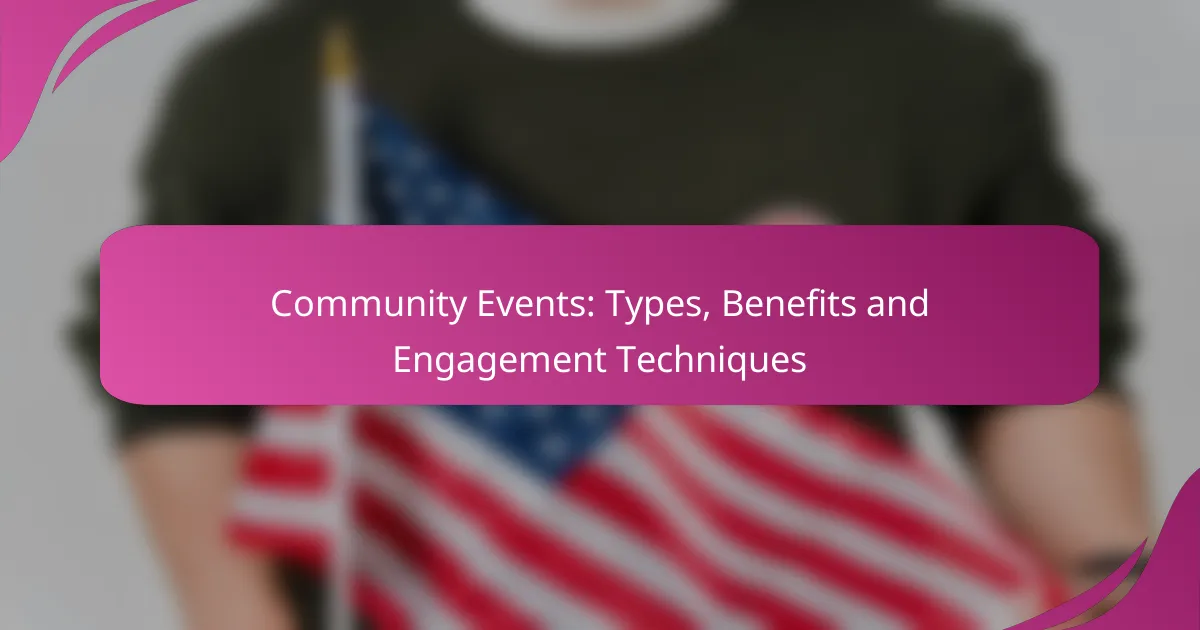Community events play a vital role in bringing residents together, offering diverse formats that cater to various interests and objectives. These gatherings not only strengthen social bonds and enhance local involvement but also support businesses and promote cultural understanding. By employing strategic engagement techniques, organizers can create memorable experiences that resonate with participants and foster a sense of belonging within the community.
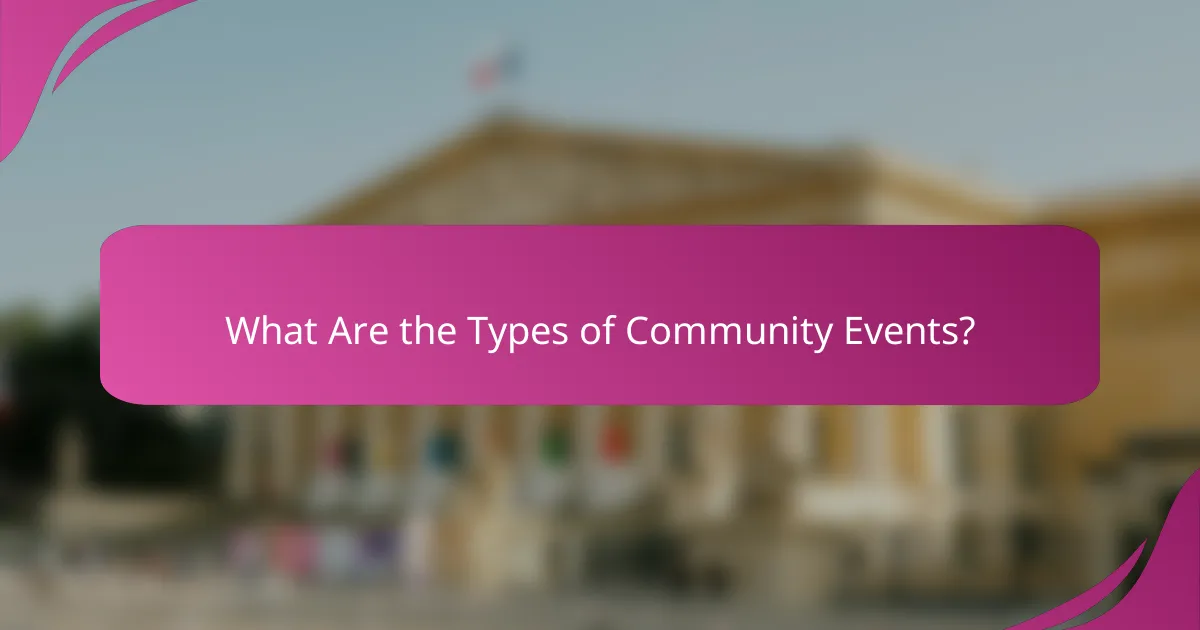
What Are the Types of Community Events?
Community events come in various forms, each serving unique purposes and fostering engagement among residents. Understanding these types can help organizers choose the right format to meet their goals and connect with the community.
Social gatherings
Social gatherings are informal events designed to bring people together for interaction and relationship building. Examples include neighborhood barbecues, potlucks, and holiday parties. These events often encourage participation from all age groups, fostering a sense of belonging.
When planning social gatherings, consider the venue, accessibility, and activities that promote mingling. Providing food and entertainment can enhance the experience and encourage attendance.
Workshops and seminars
Workshops and seminars focus on education and skill development, often led by experts in specific fields. These events can cover a wide range of topics, from financial literacy to gardening techniques. They provide valuable knowledge and foster community learning.
To maximize engagement, ensure that workshops are interactive and allow for questions. Offering materials or resources for attendees can also enhance the learning experience.
Fundraisers
Fundraisers are events aimed at raising money for a cause or organization, often involving activities like auctions, charity runs, or benefit concerts. These events not only generate funds but also raise awareness about specific issues within the community.
Successful fundraisers require clear goals, effective promotion, and engaging activities that encourage participation. Consider offering incentives for donations, such as raffle tickets or recognition for contributors.
Festivals and fairs
Festivals and fairs are larger-scale events that celebrate culture, art, or seasonal themes, often featuring food, entertainment, and vendor booths. They attract diverse audiences and can significantly boost community spirit and local economy.
When organizing a festival, focus on logistics such as permits, vendor coordination, and safety measures. Engaging local artists and businesses can enhance the event’s appeal and foster community pride.
Volunteer opportunities
Volunteer opportunities are events that encourage community members to contribute their time and skills for a common cause, such as park clean-ups or food drives. These events promote civic engagement and strengthen community bonds.
To attract volunteers, clearly communicate the impact of their contributions and provide necessary training or resources. Recognizing volunteers’ efforts can also motivate ongoing participation and support.
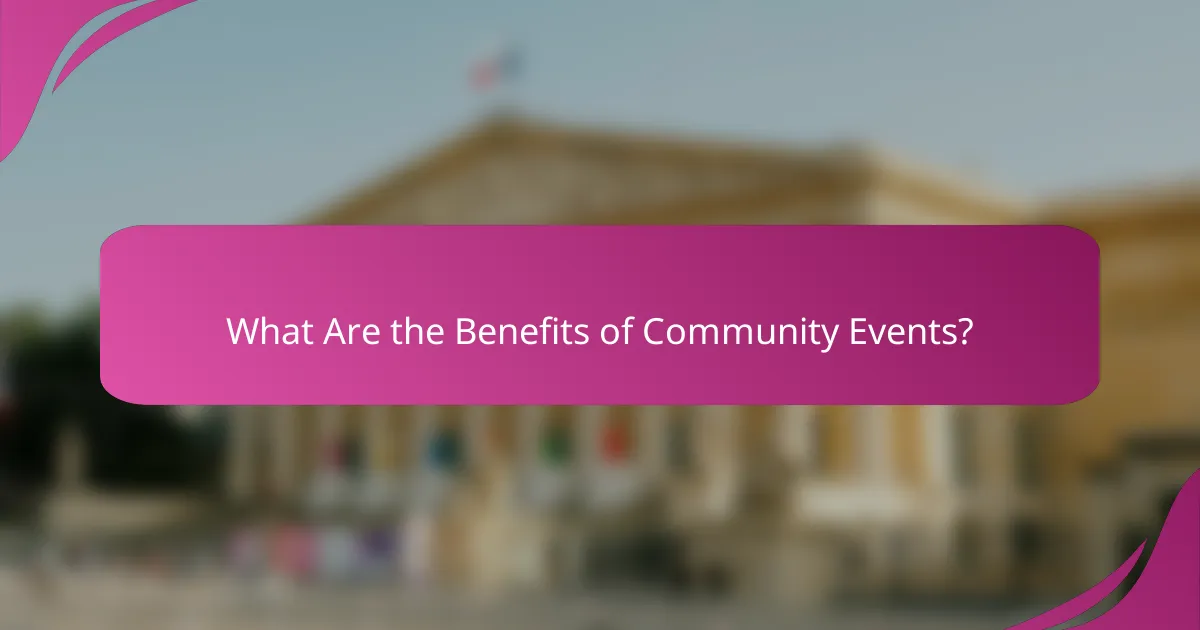
What Are the Benefits of Community Events?
Community events offer numerous advantages, enhancing social ties, boosting local involvement, supporting businesses, and fostering cultural understanding. These gatherings create opportunities for residents to connect, collaborate, and celebrate their shared identity.
Enhanced social connections
Community events foster enhanced social connections by bringing people together in a shared space. Participants can meet neighbors, make new friends, and strengthen existing relationships, which is vital for building a supportive community network.
Consider organizing events like block parties, festivals, or local sports competitions to encourage interaction. These activities create a relaxed atmosphere where individuals can engage in conversations and form bonds.
Increased community engagement
Increased community engagement is another significant benefit of community events. When residents participate in local activities, they become more invested in their neighborhood, leading to a stronger sense of belonging and responsibility.
To boost engagement, consider involving local organizations or schools in event planning. This collaboration can help attract a diverse audience and ensure that various community voices are represented, enhancing overall participation.
Support for local businesses
Community events provide essential support for local businesses by driving foot traffic and increasing visibility. When events are held in commercial areas, local shops and restaurants often see a surge in customers, benefiting from the increased activity.
Encourage local vendors to participate in events by offering booth spaces or sponsorship opportunities. This not only supports businesses but also enriches the event experience for attendees by showcasing local products and services.
Promotion of cultural awareness
Community events promote cultural awareness by celebrating the diverse backgrounds of residents. These gatherings can showcase various traditions, cuisines, and art forms, fostering appreciation and understanding among different cultural groups.
Organizing multicultural festivals or art exhibitions can be effective ways to highlight local heritage. Such events encourage dialogue and learning, helping to bridge gaps between communities and create a more inclusive environment.
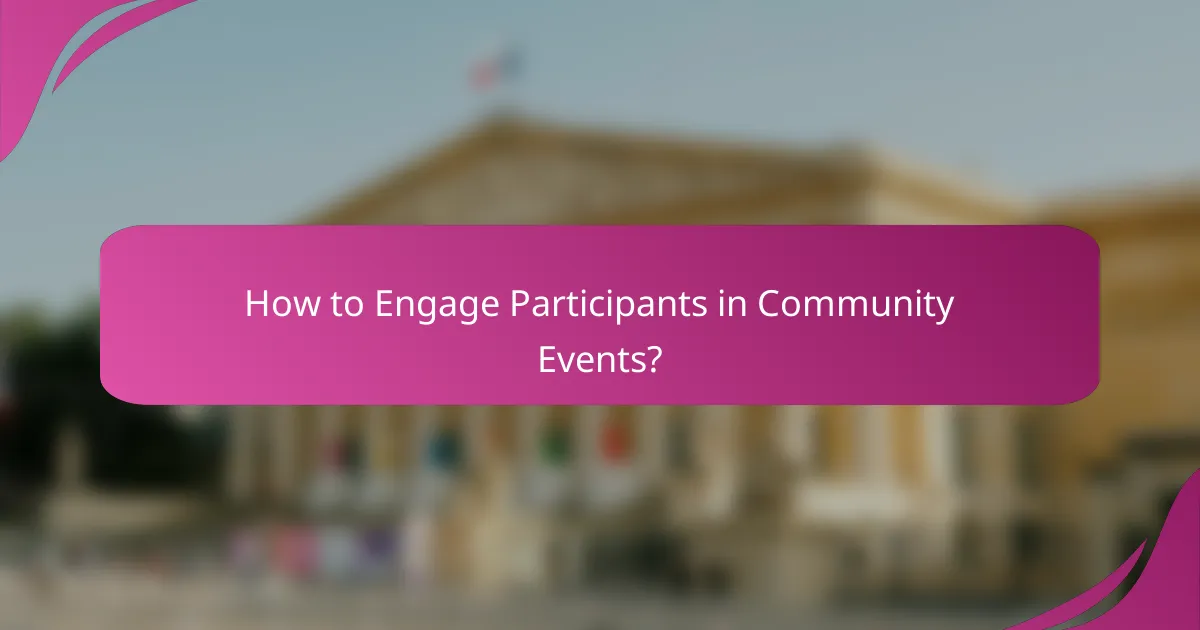
How to Engage Participants in Community Events?
Engaging participants in community events requires strategic approaches that foster connection and excitement. Effective techniques include leveraging social media, offering incentives, creating interactive experiences, and collaborating with local organizations.
Utilizing social media
Social media platforms are powerful tools for engaging participants by promoting events and facilitating discussions. Create event pages on platforms like Facebook or Instagram, and encourage sharing to increase visibility.
Regular updates and engaging content, such as polls or countdowns, can maintain interest. Consider using local hashtags to reach a broader audience within your community.
Offering incentives
Incentives can significantly boost participation rates. Consider offering discounts, free merchandise, or exclusive access to activities for those who register early or bring friends.
Another effective strategy is to host raffles or contests during the event, where participants can win prizes. This not only encourages attendance but also enhances the overall experience.
Creating interactive experiences
Interactive experiences make events memorable and engaging. Incorporate hands-on activities, workshops, or live demonstrations that allow participants to actively participate rather than just observe.
For example, setting up stations where attendees can try out new skills or crafts can enhance engagement. Ensure these experiences are suitable for all ages to maximize participation.
Collaborating with local organizations
Partnering with local organizations can enhance credibility and expand your reach. Collaborate with schools, non-profits, or businesses that share similar goals to co-host events.
These partnerships can provide additional resources, such as volunteers or funding, and can help attract a diverse audience. Highlighting local involvement can also foster a sense of community ownership and pride in the event.
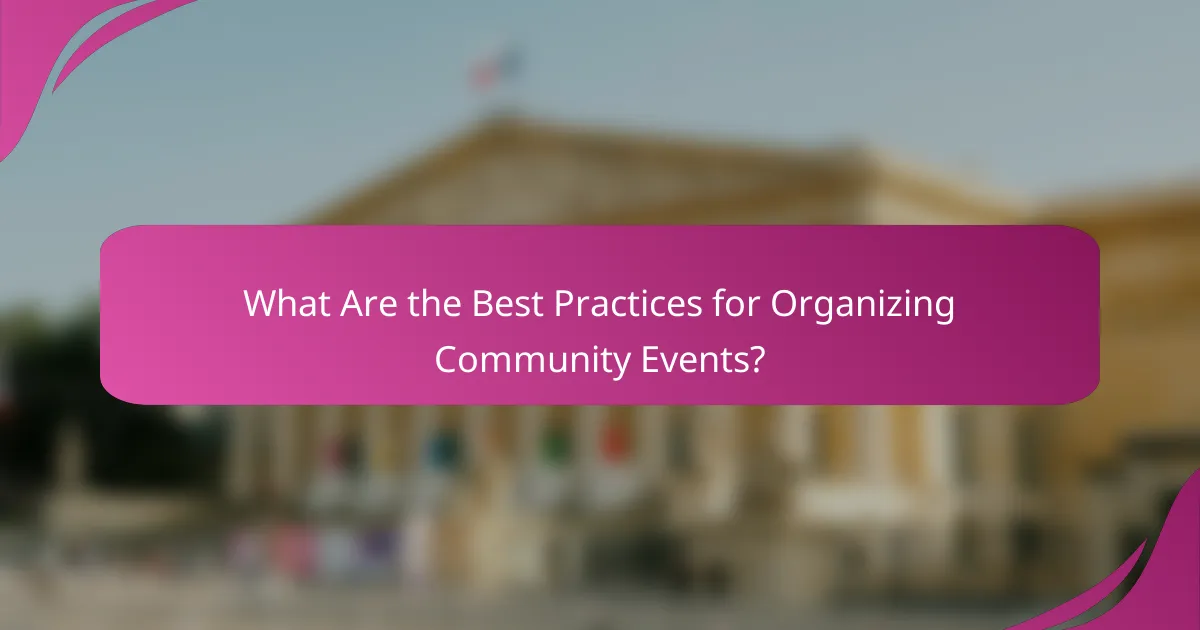
What Are the Best Practices for Organizing Community Events?
Effective community event organization hinges on clear planning and execution. By following best practices, organizers can enhance participation, meet objectives, and create memorable experiences for attendees.
Setting clear objectives
Establishing clear objectives is crucial for any community event. Objectives should be specific, measurable, achievable, relevant, and time-bound (SMART). For instance, if the goal is to raise funds, set a target amount and a deadline.
Consider the audience’s needs and interests when defining these objectives. Engaging the community in this process can help ensure that the event resonates with participants and fulfills its intended purpose.
Budget planning
Budget planning involves estimating all potential costs and identifying funding sources. Start by listing expenses such as venue rental, permits, marketing, and supplies. Aim for a budget that allows for flexibility, typically including a contingency of around 10-15% for unexpected costs.
Explore various funding options, including sponsorships, ticket sales, and community grants. Understanding local funding opportunities can significantly enhance your financial planning.
Effective marketing strategies
Implementing effective marketing strategies is essential for attracting attendees. Utilize a mix of channels such as social media, local newspapers, and community bulletin boards to reach a wider audience. Tailor your messaging to highlight the event’s unique aspects and benefits.
Engage with local influencers or community leaders to amplify your reach. Consider offering early-bird registration discounts or group rates to encourage participation.
Evaluating event success
Evaluating the success of a community event involves gathering feedback and analyzing key performance indicators. Use surveys, attendance numbers, and financial reports to assess whether objectives were met.
Post-event discussions with volunteers and attendees can provide valuable insights for future events. Aim to identify both strengths and areas for improvement to enhance future planning and execution.
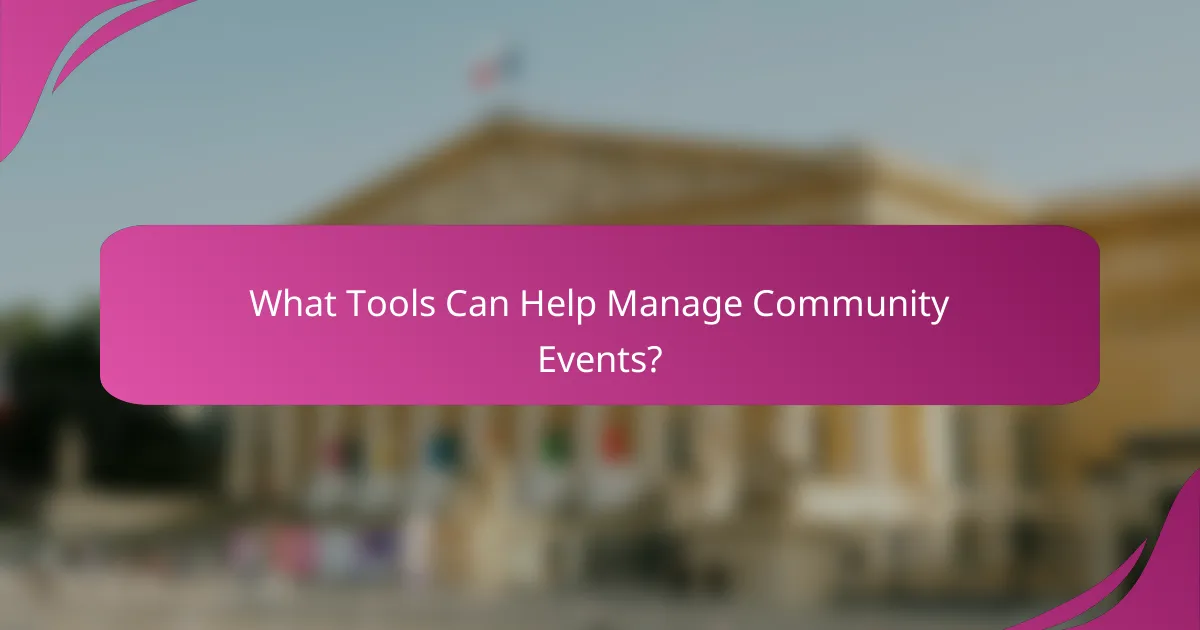
What Tools Can Help Manage Community Events?
Effective management of community events often relies on specialized tools that streamline planning, registration, and communication. Utilizing the right software can enhance organization and participant engagement, making the event more successful.
Event management software
Event management software is designed to facilitate the planning and execution of community events. These platforms typically offer features like scheduling, budgeting, task assignment, and attendee tracking. Popular options include Eventbrite, Cvent, and Asana, which help streamline processes and improve collaboration among team members.
When selecting event management software, consider factors such as user-friendliness, integration capabilities with other tools, and customer support. A clear understanding of your event’s needs will guide you in choosing the best solution. For instance, if ticket sales are a priority, ensure the software supports payment processing and reporting.
Online registration platforms
Online registration platforms simplify the process of signing up participants for community events. These tools allow attendees to register, pay fees, and receive confirmations electronically, which reduces administrative workload. Examples include Eventbrite, RegFox, and TicketTailor.
When using an online registration platform, look for features like customizable registration forms, automated email reminders, and analytics to track registration trends. Ensure the platform complies with local data protection regulations, such as GDPR in Europe, to safeguard participant information. A well-chosen platform can significantly enhance the attendee experience and improve event turnout.
